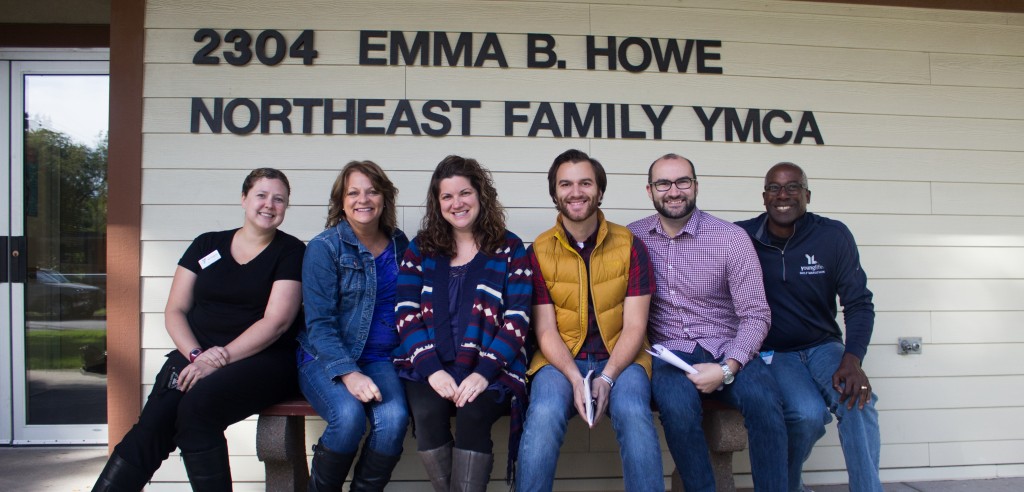
Eagle Brook's Coon Rapids staff sat down with the YMCA's Betty Notto (left) and Lisa Pung Michaelson (not pictured) to talk about what the YMCA is doing to impact the lives of youth in the Twin Cities.Most people think of a gym when they hear about the YMCA. But that really just scratches the surface of what this organization does. In fact, working with youth who are facing barriers is the heart of why the YMCA started and is the central focus of the Emma B. Howe Northeast Family YMCA.
The YMCA's Youth Intervention Services provide supportive services targeting youth, up to age 23, experiencing barriers as a result of homelessness or involvement in the foster care or juvenile justice system.Just this year, Eagle Brook built a partnership with the YMCA by working together to reach our communities.Not only does the YMCA have gyms and amazing youth services, but they also have small group Bible studies at 14 of their Twin Cities locations.
Nationally, the YMCA is in about 10,000 communities, and globally, in 120 countries. The staff at the Emma B. Howe Northeast Family YMCA serves northern Hennepin County, the suburbs north of Minneapolis, all of Anoka County, and suburban Ramsey County with their programming.
Betty Notto is the Youth Support Program Manager at this YMCA. She is an expert in homelessness prevention and has a passion for helping youth find stability and hope. Lisa Pung Michaelson is the Youth Intervention Services Program Executive, who relentlessly seeks to fill the gaps in the system for youth who are homeless or part of the foster or juvenile justice systems.
What all does your Youth Intervention Services encompass?
Lisa: We serve relentlessly with our communities until all can thrive in each stage of life. We focus specifically on young people who are facing life challenges due to foster care, involvement with the juvenile justice system, or homelessness. Those are our key areas. We also have a fourth bucket, which is our prevention and education program. We are working with youth on the cusp of entering the juvenile justice system, so we have violence prevention programs. We are also working with youth who are disconnected from the education system, so we are doing truancy prevention work as well. There is often a lot more going on in the home that is prohibiting that youth from getting to school—it's not just buying them an alarm clock. The family is in transition or they're homeless or there are mental health issues going on.
Since the 80s, we've been working with runaway, homeless youth in northern Hennepin County. We heard a community need knocking. We started some very basic services that took care of the immediate needs of these homeless youth. We learned that 80 percent of those young people who were on the streets or homeless had come out of a system—the juvenile justice system, foster care, or both.
The spectrum of youth we work with ranges from babies all the way through age 24so that's what we mean when we say youth. No matter what, no matter how the youth come to us, no matter the barriers that they are facing, we try to assess what their needs are and then assign them to the right program. Our goal is to connect kids with caring adults and community resources. We want to help find them mentors and community resources. We want to connect them to the larger YMCA because we are in so many communities, and that's a safe place where they feel welcomed.
We also have intentional one-on-one case management, which we call life coaching. These kids are not just another case to us. They are real humans and we love to listen and hear their story. We don't look at what someone put on paper about them in a report. We ask them, "Where are you now, where do you want to be in the future, and how do we help you get there?"
Ultimately, we instill hope for the future. A lot of these young people will come to us at the point of hopelessness. We want to say, "Hey, here's where you are, we accept you as you are." We use a non-judgmental approach, so it doesn't matter what's happened in your life. All of our staff are trained on trauma-informed care. We have to recognize that these youths have experienced high levels of trauma in their lives and just really need someone to support them. We empower them to make positive choices; it's their life, and it's optional to work with us, so we want to empower them to work with us and make a connection with our staff.
What are some of the core services you provide through that?
Lisa: We talked a little bit about the life coaching—we have individual one-on-ones and peer mentoring. We do community outreach that addresses immediate needs, like education and employment. This really focuses on getting people ready to be independent.Our Youth Employment Program is a 6-week cohort to teach youth skills on how to fill out an application and create a resume, how to interview, and, when they get the job, what they do and how to interact with their boss and coworkers. After that, they are eligible to do a paid internship at a YMCA branch.And our Youth Resource Line is for youth who are in need of community resources. Our staff offers referrals to YMCA or community resources based on the person's needs, they just have to call the phone number and leave a message about what they need help with.
Why are so many young people homeless?
Betty: Often, it's because of family conflict, or the family is homeless and the youth can't make it work with their parents. A lot of the young people that we work with are a part of a system, like foster care or juvie, and they just didn't get the support they needed while they were there. Coming out as a GLBTQ is also a huge factor. Kids will get kicked out of their homes for that. Or, mom or dad could have mental health issues which can cause a lot of instability.
Why do you do what you do? What keeps you going?
Betty: It's hope. If I didn't think we could end homelessness, I wouldn't even bother. To be honest, if I just focused on what's on the news and what's on social media, I probably wouldn't leave my house. But I have hope that people want help and need help. I've been given so much in my life that how dare I keep it to myself?
Lisa: I saw all these gaps in the system when I worked for the county, and I wanted to be a part of helping to fix those gaps so that no one would be lost in the system. All these systems were put in place to protect kids, but it just has a lot of gaps. I found that the programs at the YMCA were filling in a lot of these gaps that were missing when I worked for the county. And they were innovative in finding a way to fill those gaps. It's tough sometimes, but it gives you so much energy knowing you can have an impact on a person's life, that you can be the one person that helps them change their life.
We asked this question of our staff one day, and the answers that really stuck with me was, "Because I had a caring adult in my life who mentored me and gave me the support that I needed." And the next person stood up and said, "I didn't have that and that is why I want to help."
What do volunteer roles look like at YMCA?
Betty: You can sign up to host or to support a host. Hosting is obviously opening up your home for a child to live in, and supporting a host is helping host family with supplies, such as food, beds, clothing, etc.
What does your hosting program look like?
Betty: Community host homes are specific to Anoka County and are a fairly new program. There are youth, living in Anoka County, who need a stable place to live but are not quite ready to be completely independent. So there are people in the community who want to help in a meaningful way, who open up space in their homes for a youth to live with them.
What does the process look like if someone wanted to open up their home for hosting?
Betty: We have you fill out an application and do a full background check. We have some stipulations for the program: you have to have a room for them, have to be able to provide food, and you have to live in Anoka county. We want to keep them in the community and avoid moving them across town. We have some training that host families have to go through. We like to ask people to make a year-long commitment because that is generally the amount of time these youth need before they're ready for their next step. We want more stability in that youth's life because they have already been bouncing around too much. Generally, these kids range from ages 16-21. We get a lot of kids that just want to finish high school and then move on.
How much parenting takes place? Or are you just providing them a place to stay?
Betty: The big part of training and working with host families before they host is around expectations. Same thing with young people. This program is really unique in that our process of vetting is a little more intentional. We are very intentional about matching kids with the right host home. We ask the kids if they want more of a roommate situation or a family situation, and let them decide. But still, we let them know that there will be some rules because you are living communally with another family.
How do you make sure it's a good situation for both the host and the youth?
Betty: We are in constant contact with the youth during the time they are living with the host family. We make sure expectations are set on what it will be like to live with the host family and on when they are to transition out and into a more permanent solution. If a child is going to be there for a year, we will be working with them on what it looks like for their next living scenario so the transition is easier on the host family and the child.
The YMCA is also constantly involved in this process with you, the host. You don't just sign you up and then we leave you on your own. Our staff members are walking with you during the entire time a youth stays with you. These are still the YMCA's kids and we want to make sure both parties are doing well and not getting burned in the process. This is not a parenting situation—this is you providing a home for a kid to stay in while they get the support and help they need from different resources the YMCA provides. How can you be a supportive role model for that youth and make sure he or she is set up for success? This is a good way to approach it.
The YMCA will be hosting a training night for new host home volunteers on Nov. 7 at the Spring Lake Park campus. If you have questions about what it means to be a host family, reach out to Betty at
.


